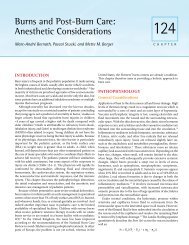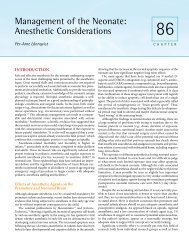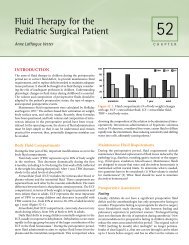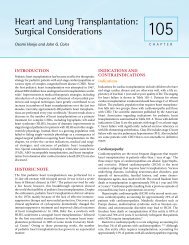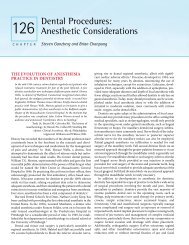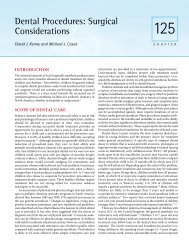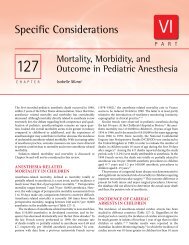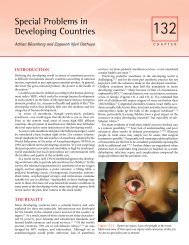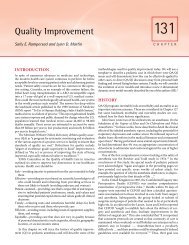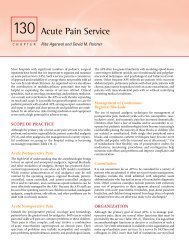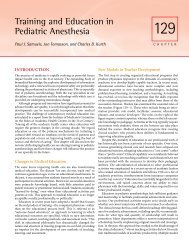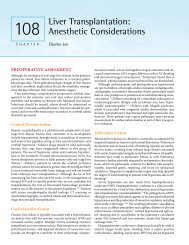Chapter 133
Create successful ePaper yourself
Turn your PDF publications into a flip-book with our unique Google optimized e-Paper software.
2174 PART 6 ■ Specific Considerations<br />
quantity of surgeries to expect. The administration can make clear<br />
the goals of the trip and the rules of team conduct.<br />
Sexual harassment, either physical or verbal, is not to be<br />
tolerated and may result in a team member being sent home for<br />
engaging in these activities. Romantic liaisons with a team member<br />
or a local person may threaten the present trip and future trips<br />
to that site. Logistic details such as living arrangements, costs to<br />
the team (meals and other expenses) should be made clear. Team<br />
members should be told approximately how much money they<br />
will require for expenses. One member of the team should be<br />
designated as the “team physician”; the most appropriate person<br />
for this role is the pediatrician/general practitioner, if there is one<br />
as part of the team. This person should be made aware of health<br />
problems of team members (e.g., diabetes, asthma) before the trip<br />
begins (not during the phone call, for reasons of confidentiality).<br />
If infectious diseases such as avian flu are prevalent at the trip site,<br />
the team should be told how sick team members will be treated<br />
medically and how they will be evacuated home. Team members<br />
who have previously been to the site can address local customs<br />
and dress code. Drugs, tobacco, and alcohol use can be discussed<br />
and the rules made clear by the organization’s leaders. Giving<br />
individual gifts or money to patients or their families often causes<br />
problems, because one group may perceive that they received a<br />
lesser gift than another. The organization can indicate during the<br />
phone call that the organization will give the same gift to each<br />
patient/family and avoid these problems. Often the hosts at a site<br />
give small gifts to team members. It is difficult to refuse these gifts<br />
without seeming rude.<br />
TEAM LEADERSHIP<br />
Each trip should have a team leader who is responsible for the dayto-day<br />
running of the trip and for solving problems. Each specialty<br />
group (anesthesiologists, surgeons, nurses, etc) should have a<br />
leader who deals with the day-to-day details of the trip related to<br />
their specialty. Trips function better when there are frequent<br />
discussions between the leaders and the team members. Having<br />
team meetings at breakfast or dinner, when everyone is together,<br />
is one way to accomplish this. Cases for the day or any problems<br />
that occurred with the surgery schedule can be discussed. Before<br />
the first surgery takes place, it is helpful to have a team meeting<br />
to orient team members to the site and let them know where the<br />
fire extinguisher, emergency oxygen tanks, emergency drugs, defibrillator,<br />
and so on are located. During this meeting, team<br />
members can be told how to contact the pediatrician/general<br />
practitioner during the day and how emergencies will be handled,<br />
especially if a patient must return to surgery for any reason. If a<br />
patient requires intensive care, some organizations put the patient<br />
in the hospital’s intensive care unit (ICU) and others have an<br />
anesthesiologist and a postanesthesia care unit (PACU) nurse care<br />
for the patient in the PACU. If an anesthesiologist and nurse are up<br />
all night caring for a patient, they may be tired and not function<br />
well the following day. This may necessitate canceling some<br />
surgery. Canceling cases may be difficult, but if it is safer for<br />
patients it must be done. A surgeon, anesthesiologist, nurse, and<br />
translator should make rounds after dinner and see all patients<br />
operated upon that day to determine whether there are any<br />
problems and if the patients have adequate pain relief. The same<br />
group can take night call that night. The hospital must be able to<br />
contact the team leader at all times, including night and weekends.<br />
CHOOSING AND EVALUATING SITES<br />
Although different organizations use different models for site<br />
selection, it is generally considered best if organizations are invited<br />
to provide surgery in a country by physicians, governments (local<br />
or federal), or service groups (Rotary clubs, Lions clubs, etc). If<br />
local medical professionals are not involved in the invitation, they<br />
may feel the trip was forced on them and refuse to work or<br />
cooperate with the team. Government officials also must be aware<br />
of the invitation. Without the government’s cooperation, the team<br />
may be denied entrance to the country and may be prevented from<br />
doing surgery. After all, it is the government that allows team<br />
members to practice medicine in their country without a license.<br />
Most countries allow us to practice medicine, nursing, and so on<br />
in-country without having a license to do so, for the time we are<br />
there. Malpractice insurance is seldom available for this type of<br />
work. To date, there have been no lawsuits for such care. Host<br />
physicians are responsible for all interactions with the team and<br />
the parent organization. The host must be able to communicate<br />
with the organization’s offices by e-mail or by telephone.<br />
When an organization considers performing surgery in a<br />
country, a letter asking certain questions should be sent to whoever<br />
it was that proffered the invitation, such as questions regarding the<br />
stability of the government and whether bribes are expected to<br />
permit teams to work in the country are important. It is illegal for<br />
Americans to take or give bribes in this situation, according to the<br />
Foreign Corrupt Practices Act (http://www.justice.gov/criminal/<br />
fraud/fcpa). Whether it is safe for foreigners to be in the country<br />
must be addressed.<br />
Are there sufficient patients who require the type of surgery<br />
that can be provided? If there are, how will they be recruited? Will<br />
newspaper, television, and radio advertisements be used? Who<br />
will place the advertisements, when will they be placed, and who<br />
will pay for them? Are similar surgical groups working in the area<br />
and when were they last there? If other teams have been in the area<br />
recently or recruiting was inadequate, insufficient patients may be<br />
available to make the trip cost-effective or satisfying for the team<br />
members.<br />
The parent organization and CMO must make clear to the host<br />
what type of surgery the team can and will do. Orthopedic<br />
surgeons will not repair cleft lips and plastic surgeons will not do<br />
pelvic osteotomies. It is then up to the host physician(s) to find<br />
appropriate candidates for surgery. The host(s) must be willing<br />
and able to provide needed follow-up care for the patients after<br />
the team leaves. Ideally, this person should be a surgeon who will<br />
be the focus of teaching during a trip and who has the potential to<br />
lead her/his own team and provide the same type of surgery for<br />
poor patients in the future. For burn patients in particular, the<br />
personnel and the facilities must be available for postoperative<br />
care, including splinting and physical therapy if required.<br />
Who will help with customs, transport of the team and<br />
equipment from the airport to the hotel, and from the hotel to the<br />
hospital? Will someone be available every day to help solve<br />
problems? If the team’s equipment is confiscated or delayed by<br />
customs, as it sometimes is, how will this problem be resolved? Is<br />
there a locked, safe room in which to store equipment and drugs?<br />
Who will have access to this area at night? How will the team<br />
access this room at night if they must provide emergency surgery?<br />
Is the operating environment adequate? Are there sufficient<br />
rooms in which to perform surgery without compromising patient<br />
safety or the ability of local surgeons to care for their patients?<br />
How many operating rooms will be available to the team? Placing



